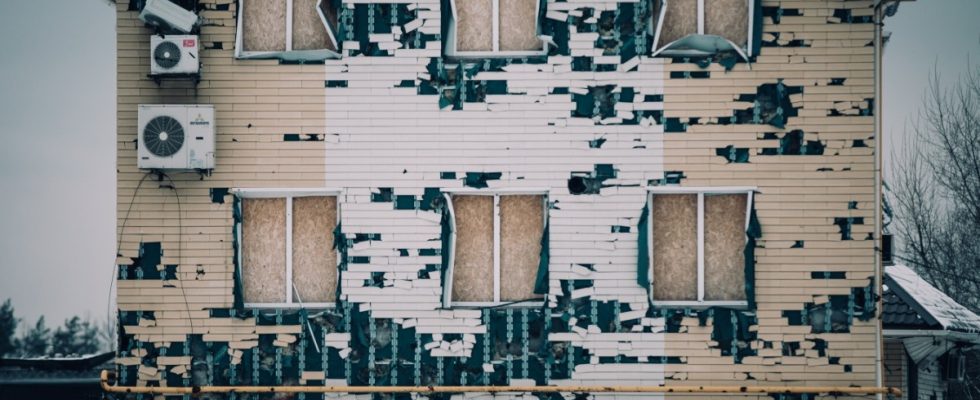It is news that, at least at first glance, does not seem to fit together: On Wednesday night, Russia continued its attacks on Odessa and the Ukrainian energy infrastructure. The Ukrainian Air Force reported that 17 Iranian-made combat drones were used by the Russians. We were able to shoot down 14 of them. The damage balance is once again significant. The attacks are said to have damaged several energy supply systems in the south of the country. Meanwhile, at its cabinet meeting on Wednesday morning, the federal government decided on a key issues paper with the promising title: “Reconstruction of Ukraine”.
While the Russian tyrant Vladimir Putin is systematically driving forward the destruction of Ukraine and the question is becoming ever louder as to how long the air defense of the invaded country will last, the federal government has formulated 15 points on how reconstruction can be promoted. This is not a contradiction, explained Development Minister Svenja Schulze (SPD). “Ukraine needs more than weapons to survive in this war. It is also important that the economy continues to run and the country can finance reconstruction,” she said.
Public funding alone will not be enough
Vice Chancellor Robert Habeck (Greens) made a similar statement: “When we think of Ukraine, we primarily have the frontline region in mind. But Ukraine doesn’t just need our continuous military support,” said Vice Chancellor Robert Habeck (Greens). Every opportunity must be used “to help the Ukrainian economy in this difficult time and to open up prospects for it.”
This is exactly what a major reconstruction conference on June 11th and 12th in Berlin will be about, to which Chancellor Olaf Scholz (SPD) is inviting together with Ukrainian President Volodimir Zelenskiy. For Scholz, the message he hopes for is twofold. The Chancellor wants to underline Germany’s leadership role in helping Ukraine to his partners and make it clear to Putin that support for Ukraine is intended to be long-term.
However, it is also clear that the task becomes more expensive with every day of the war, with every attack and every damaged power plant. The World Bank already estimates the costs of reconstruction at around 486 billion US dollars (528 billion euros). Deputy government spokeswoman Christiane Hoffmann made it clear that the enormous damage could not be repaired with public funds alone. Public and private actors must therefore work closely together.
“Good intentions instead of concrete announcements,” says the CDU
The key issues paper talks about “interlocking” and “improved interaction” of various instruments to promote investments in Ukraine. The Ukrainian Business Development Fund, which Ukraine founded in 1999 together with the German Kreditanstalt für Wiederaufbau and which is aimed primarily at small and medium-sized companies, is to be strengthened. Access to investment and export guarantees is to be made even easier, although it is already “very far-reaching” in international comparison.
The company’s deductible in individual damage cases should be reduced from five to 2.5 percent. The federal government also wants to ensure that interest income from frozen Russian assets is used for the reconstruction of Ukraine. However, the EU also wants to use this money to buy weapons for Ukraine. “Good intentions instead of concrete announcements characterize the federal government’s concept,” criticized the development policy spokesman for the CDU/CSU parliamentary group, Volkmar Klein.
Who can supply “Patriot” missiles?
In any case, the question is how companies can be persuaded to invest in Ukraine when Russia attacks the capital Kiev and other metropolitan areas with missile and drone attacks. Ukraine does not have enough anti-aircraft systems to protect the country comprehensively, and the number of anti-aircraft missiles is running low. President Zelenskiy is therefore making increasingly desperate appeals to Western states to strengthen Ukraine’s air defense. The country needs 25 of those made in the USA patriotsystems.
France and Germany have taken on particular responsibility; they coordinate support. Federal Foreign Minister Annalena Baerbock (Greens) referred on Tuesday to the meeting with her NATO colleagues, at which those involved agreed to create an overview of the systems available in Europe and around the world and to pursue the idea of a fund to support air defense systems in third countries around the world to buy and deliver to Ukraine.
The first results should be available by the G-7 foreign ministers meeting next week in Italy. However, especially the German ones patriot-Inventories “now pretty exhausted.” According to the Ministry of Defense’s assessment, it would no longer be possible to fully fulfill the commitments made to NATO if there was a further levy.

